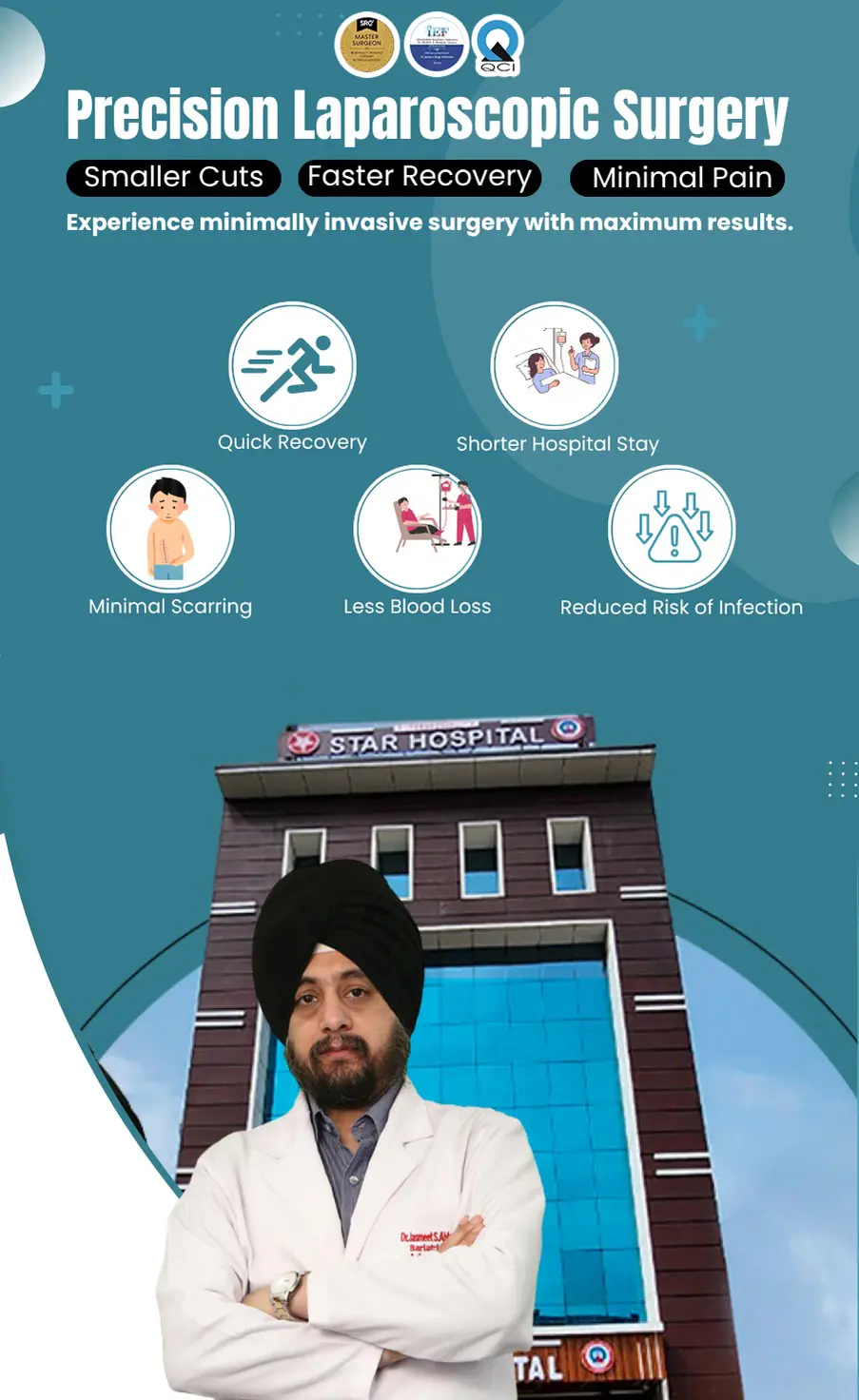



Weight Loss Surgery in Jalandhar

Quality Healthcare
Anywhere, Anytime
Professional and Experienced staff ready to help you
Refined Weight Loss Solutions for a Healthier Body and Mind

Neat & Clean Rooms
Spotlessly clean, profoundly caring. Our hospital ensures a pristine environment for your well-being

Modern Equiments
Our hospital has advanced technology gadgets and the best equipment in every field.

City Centre Location
Conveniently located at the heart of the city, our hospital offers easy access and exceptional care in a prime city center location
Laparoscopic Mini-gastric bypass surgery (MGB) is a type of surgery that helps to lose weight. In this procedure, the surgeon creates a small pouch in the stomach by reducing its portion in a surgical procedure. After that, this pouch is connected to a loop of the small intestine, and due to this rearrangement, the body doesn’t absorb all the nutrients and calories, resulting in weight loss. It also helps with resolving other problems like reduced cardiovascular risk, diabetes, high blood pressure, and many more.
The gastric bypass surgery is also known as the Roux-en-Y Gastric Bypass. In this surgery, the surgeon staples the stomach creating a small pouch on top of the stomach and then connects it to the middle part and lower part of the small intestine this leads to bypassing the rest of the stomach and the upper part of the small intestine. This surgery reduces the intake of food and the absorption of calories and nutrients. This dual connection to the stomach creates Y shaped configuration which is why it is called a roux-en-Y gastric bypass.
Sleeve gastrectomy is the third type of bariatric surgery. In this surgery, a bougie (a thin, flexible tube) is inserted into the middle or lesser curvature side of the stomach through the mouth. This bougie helps in determining the size of the stomach to be left and the remaining part of the stomach is removed in this surgery. Once the surgery is performed the surgeon removes the bougie leaving a banana-shaped stomach. This surgery doesn’t include any changes in the digestive system as it allows the natural flow of food into the small intestine.
BARIATRIC SURGERY HOSPITAL IN JALANDHAR

Weight Loss Surgeon In Jalandhar
- It helps in attaining substantial weight loss
- Helps in Improving type 2 diabetes
- It enhances fertility
- Lower the risk of cardiovascular diseases
- Helps manage GERD
- Increases energy levels
- It improves metabolic syndrome
- Lower the risk of certain cancers
- Make some dietary changes as recommended by the surgeon
- One should stay well hydrated throughout the day
- Regular exercise is recommended
- Take prescribed supplements or drugs
- One should avoid smoking and alcohol
- Attend all scheduled follow-up appointments with the surgeon
Bariatric Surgery Cost In Jalandhar
Weight Loss Surgery Cost
Details
Bariatric Surgery Cost in jalandhar
2 Lakh to 2.5 Lakh INR
Open
9:00 am to 6:00 pm
Working Days
Monday – Saturday
Mobile Number
+91-9888958889
Note: These are tentative costs and actual cost may vary on patient to patient basis depending upon specific conditions
Cost of Bariatric Surgery at our Centre ranges from 2 to 2.5 Lakhs. It depends upon many factors like type of procedure, age of patient, BMI of patient, presence of other diseases along with obesity etc. For More Detail Contact Us Now
Bariatric Surgery is done to reduce weight. There are many types of Bariatric Surgeries. Some decrease the size of stomach to decrease amount of food a person can eat before feeling full (eg. Sleeve Gastrectomy). In some procedures part of small intestine is bypassed so that absorption of food decreases (eg. Mini Gastric Bypass). Some are combination of both. Obesity related problems like Diabetes Type 2, high BP, high cholesterol, breathing trouble etc also get remitted or become better afterwards.
There are many types as Bariatric Surgery, but the most common types these days are-
- Sleeve Gastrectomy
- Mini Gastric Bypass
- Roux]-en-Y Gastric Bypass
- Adjustable Gastric Band
- INTRA-GASTRIC BALLOON
Usually people are able to return to work after 7 to 10 days from surgery.
Most of our patients go home in 2 to 3 days after surgery. Some patients may need 1 or 2 more days depending on their presurgical comorbidities.
Bariatric Surgeons are not that common in present times as it is a complex surgery to be done on complex patients and require additional training on the part of surgeon. Our Hospital is proud to have a surgeon who has Super-Specialised in the field of Bariatric and Metabolic Surgery and is trained from best of the centres both in motherland and abroad. He has been in private practice after that since many years and has a long series of cases under him from around the world. For More Detail Contact Us
Yes but it depends upon the degree of heart disease. Many patients undergo Bariatric Surgery even after stents in heart or open heart surgery (Bypass Surgery). Cardiologist, anaesthetist and surgeon examine the patient and tests before surgery and discuss the amount of risk involved. There are many types and degrees of heart diseases so according risk score will be calclulated.
How much weight can I expect to lose?
In general, individuals who are suffering from severe obesity are usually considered eligible for bariatric surgery but there are no certain criteria that can be considered for the eligibility for weight loss surgery. One should always consult a bariatric surgeon before considering any surgery as the eligibility criteria may vary from various factors like age, gender and other factors. Here are some of the common factors that have to be considered to check the eligibility of bariatric surgery.
1. Individuals with a BMI above 35 are considered to be eligible for bariatric surgery.
2. Patients who have previously undergone any weight loss procedure.
3. Patients who are suffering from any other obesity-related health conditions.




